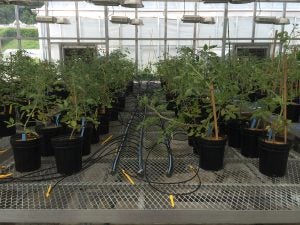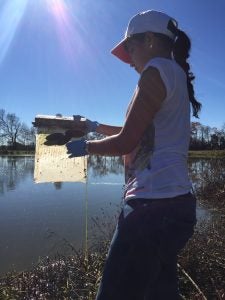Impacts of water use strategies viewed through the lens of plant microbiology 
In California, increased water scarcity is driving many agricultural producers to alter their water use practices. These changes include increased reliance on recycled water and low quality ground water (quality), and reduction of irrigation inputs (quantity). Our program at the University of California Davis seeks to demystify disease-risks related to changes in water quality and quantity, enabling producers to optimize water use and minimize disease losses.
Research themes:

- Pathogen predisposition risks factors associated with saline groundwater and deficit irrigation
- Effects of irrigation practices on opportunistic pathogens in the rhizosphere
- Effects of water use on defensive mutualisms
- Enabling water recycling: Management of pathogens in the water recycling chain
- Using water saving methods to co-manage plant pathogen survival and spread
- Biological approaches to mitigate disease risks associated with water use
Current Projects
Co-managing deficit irrigation-disease interactions to optimize water conservation and productivity in processing tomatoes
Lead PI: Cassandra Swett; CoPIs: Mallika Nocco, Tom Turini, Amisha Poret-Peterson
Funded by USDA-California Specialty Crop Block Grant Program
Recent Publications
Beaulieu, J., Nocco, M. and Swett, C.L. 2022. Effects of water scarcity-driven irrigation practices on disease management in California processing tomato. Acta Horticulturae.
Beaulieu, J., Belayneh, B., Lea-Cox, J. D., & Swett, C. L. (2022). Improving Containerized Nursery Crop Sustainability: Effects of Conservation-driven Adaptations in Soilless Substrate and Water Use on Plant Growth and Soil-borne Disease Development. HortScience, 57(6), 674-683. DOI: https://doi.org/10.21273/HORTSCI16459-21